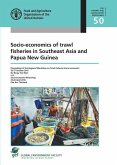Focusing on the menhaden fishermen of the southern coastal regions, The Fish Factory is an engaging and insightful exploration of what work means to different social groups employed within the same industry. Since the nineteenth century the menhaden industry in the South has been traditionally split between black crews and white captains. Using life histories, historical research, and anthropological fieldwork in Reedville, Virginia, and Beaufort, North Carolina, Barbara J. Garrity-Blake examines the relationship between these two groups and how the members of each have defined themselves in terms of their work. The author finds that for the captains and other white officers of the menhaden vessels - men "born and bred" for a life on the water - work is a key source of identity. Black crewmen, however, have insisted on a separation between work and self; they view their work primarily as a means of support rather than as an end in itself. In probing the implications of this contrast, Garrity-Blake describes captain/crew relations within both an occupational context and the context of race relations in the South. She shows how those at the bottom of the shipboard hierarchy have exercised a measure of influence in a relationship at once asymmetrical and mutually dependent. She also explores how each group has reacted to the advent of technology in their industry and, most recently, to the challenges posed by those proclaiming a conservationist ethic.
Hinweis: Dieser Artikel kann nur an eine deutsche Lieferadresse ausgeliefert werden.
Hinweis: Dieser Artikel kann nur an eine deutsche Lieferadresse ausgeliefert werden.








